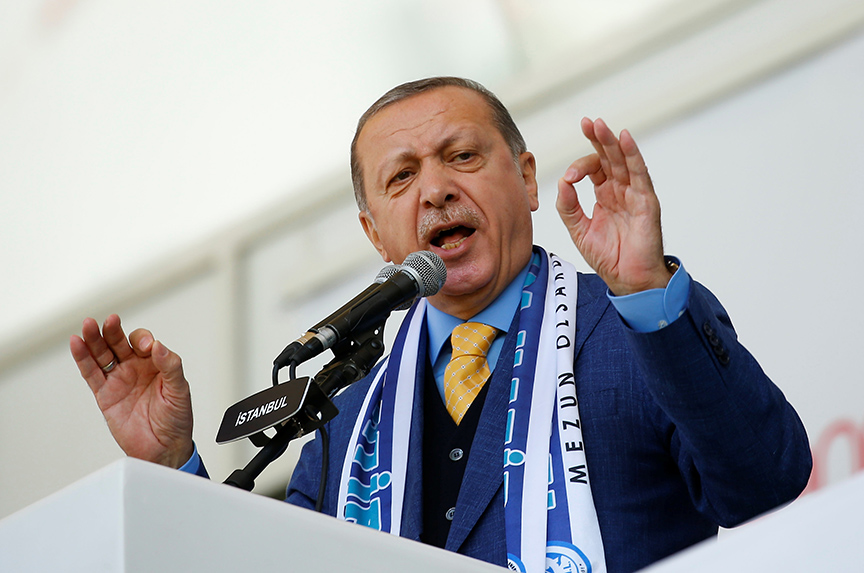 The title of Sir Peter Westmacott’s new paper, Turkey’s European Journey, does not indicate where he thinks the country stands on that path, whether he believes Ankara is still headed toward Europe or whether it has turned off that road permanently. A conversation with Westmacott, a distinguished ambassadorial fellow with the Atlantic Council’s Future Europe Initiative who has served as the United Kingdom’s ambassador to France, Turkey, and the United States, sheds more light on how he sees Turkey’s current status under President Recep Tayyip Erdoğan.
The title of Sir Peter Westmacott’s new paper, Turkey’s European Journey, does not indicate where he thinks the country stands on that path, whether he believes Ankara is still headed toward Europe or whether it has turned off that road permanently. A conversation with Westmacott, a distinguished ambassadorial fellow with the Atlantic Council’s Future Europe Initiative who has served as the United Kingdom’s ambassador to France, Turkey, and the United States, sheds more light on how he sees Turkey’s current status under President Recep Tayyip Erdoğan.
Westmacott said if there were a subtitle on his book, it would read “A Missed Opportunity.” He said when Erdoğan’s AK (Justice and Development) party was created in 2001, initially “there was a real movement in the direction of reform, modernization, and eventual Turkish membership of the European Union [EU].” Westmacott recalled that at the time this political development was likely the “most dramatic improvement in what was going on economically, socially, and in terms of institutional reform that Turkey had seen in a very, very long time.” The energy he felt during that period, Westmacott said, is one of the reasons he wanted to pen this look back at his years there. Westmacott served as the UK ambassador to Turkey from 2002 to 2006.
Turkey’s turn for the worse
In the short book, Westmacott recalls a time when then-political leader Erdoğan conveyed to him personally that he would do everything in his power to transition Turkey into a nation that observed Western values and could become an EU member. Westmacott described his experiences with Turkish leaders, diplomats, and people, dating from his first tour there in the mid-1970s, as full of life and dialogue and close engagement, both official and unofficial.
However, “much has changed since then,” he observed, adding the changes have not steered Turkey in the right direction. Last July’s failed coup provoked Erdoğan to declare a harsh—and ongoing—state of emergency in a continuing effort to neutralize political opposition in the population. Westmacott said he has heard from friends in Turkey that the “threat to Turkish democracy coming from the Fethullah Gülen movement,” a pervasive element he describes in more detail in his book, is now over. That is, of course, after tens of thousands of people have been dismissed from their jobs, and many thrown in prison without any due process. How the government’s accusations regarding the cause of the coup attempt will be proven or disproven is unclear, as the judicial branch has also been gutted by the president’s purge.
Is there any way back?
So what now? Is Turkey’s “European journey” at a dead end? Westmacott maintains the country still has “every right to be considered as a European country and an eventual candidate for [EU] membership.” At the same time, he said “there are some question marks, particularly about the criteria which would have to be met, if Turkey were to breathe new life” into membership negotiations, particularly regarding freedom of expression, the rule of law, independence of the judiciary, and transparency in business dealings. Westmacott said it is not clear yet whether the government is actually planning a re-introduction of the death penalty, a suggestion that has gained new life in the aftermath of the coup attempt, which would automatically render Turkey ineligible for EU membership.
He notes that despite the current chaos in Turkey, there have been years of solid partnership between Ankara and both NATO and the European Union. Westmacott believes it is not too late for Turkey and Europe to move back into constructive dialogue that would be better for “everybody’s interests,” even beyond the two sides.
However, he warned, there is not an unlimited time frame in which to achieve this. “It’s tough,” he said. “It’s difficult. But I do think that if an attempt is not made to put Turkey back into a better place within the next year or two, certainly this side of the presidential elections in 2019, then it could be difficult to restore the credibility of the institutions,” he said, adding, “Turkey deserves better.”
Teri Schultz is a Brussels-based freelance journalist. You can follow her on Twitter @terischultz.
Image: Turkish President Recep Tayyip Erdoğan delivered a speech during a graduation ceremony at an Imam Hatip religious school association in Istanbul, Turkey, on May 26. (Reuters/Murad Sezer)
